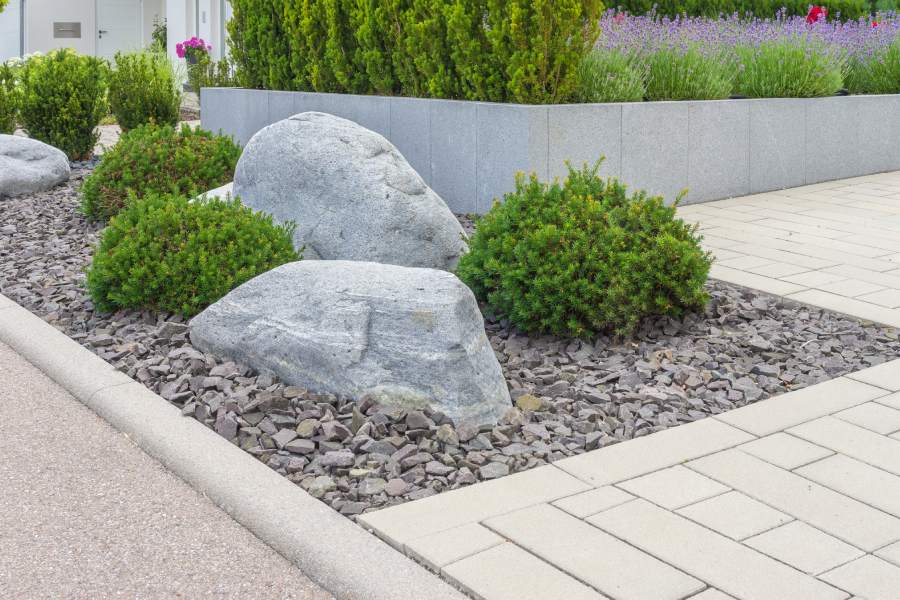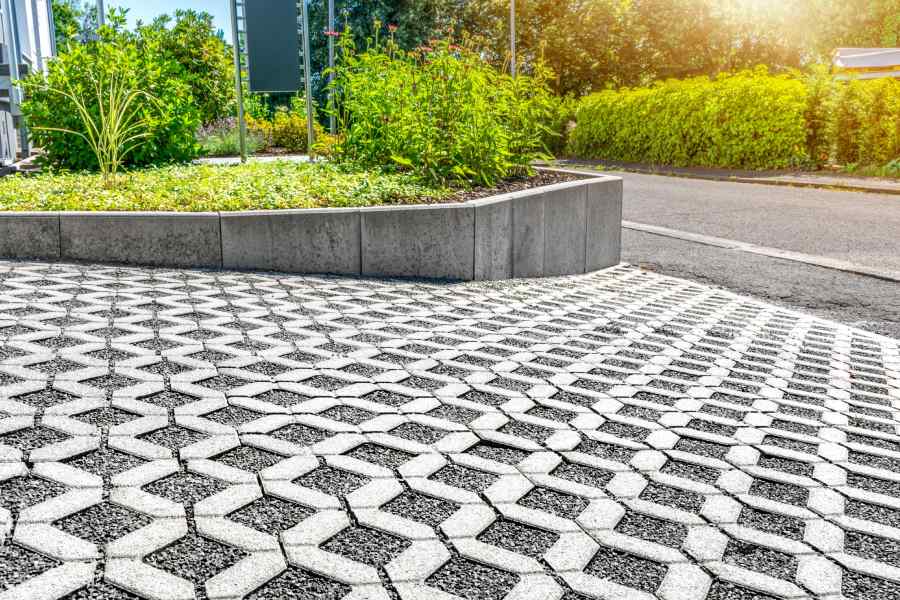Types of Paving

When it comes to enhancing outdoor spaces, the type of paving you choose can significantly impact aesthetics and functionality. With several types of paving available, each one offers its unique charm and benefits, making it essential to select the right one for your landscape.
Whether you’re aiming to create a cozy patio, a sturdy driveway, or a picturesque pathway, we will help you make your best decision. So, this guide explores the main types of materials, their characteristics, and their best uses to help you choose the right option for your project.
Continue reading!

Types of Paving
Paving, at its core, involves creating a durable surface layer for pathways, driveways, patios, and other outdoor spaces. Paving materials come in various forms, each tailored to meet specific construction and landscaping needs.
From traditional options like concrete to modern innovations such as permeable, these choices influence a project’s durability, cost, and aesthetic appeal.
Different materials for paving offer unique advantages, particularly regarding installation methods, maintenance requirements, and longevity. Here are the best types:
Concrete paving
Concrete paving is one of the most durable and versatile options in modern construction. It can withstand heavy traffic and extreme weather conditions, boasts exceptional compressive strength and requires minimal maintenance, making it ideal for sidewalks, patios, and commercial entrances.
Compared to asphalt driveways, concrete is often chosen for its longer lifespan and lower maintenance demands, although asphalt provides a smoother driving surface and is quicker to install, making it popular for large-scale projects.
Furthermore, the material can be enhanced through various finishing techniques, including stamping, staining, and texturing, which allow for greater aesthetic appeal. Its adaptability also extends to installation methods, accommodating pre-cast and poured-in-place applications.
With its long lifespan and resilience, concrete paving is a cost-effective choice for residential and commercial projects. When properly installed and maintained, it can last several decades while maintaining its structural integrity.
Asphalt paving
Asphalt paving is a standout choice for road construction and parking facilities, providing a smooth, continuous surface that enhances driving comfort. Its dark color naturally absorbs heat, which is especially beneficial in snow-prone regions, helping to melt ice and improve safety. Also, asphalt’s flexibility allows it to endure temperature fluctuations without cracking, ensuring longevity.
The installation process for asphalt is notably quicker than other paving options, reducing disruption to traffic flow. Its ease of repair and resurfacing extends the material’s serviceable life, making it a practical choice for many projects. Lastly, asphalt’s excellent recyclability adds to its appeal, positioning it as an environmentally conscious option for large-scale applications.
Brick paving
Brick paving exudes a timeless charm that enhances the aesthetic appeal of any outdoor space, particularly in traditional and heritage-style properties. Its natural clay composition offers exceptional durability and weather resistance, making it an ideal choice for walkways, patios, and garden paths.
The unique color variations and textures of each brick create distinctive patterns, adding character to the environment. Installation techniques for brick paving can range from simple running bond patterns to more intricate herringbone designs, allowing for various artistic expressions.
Moreover, brick pavers can be installed flexibly, either dry-laid on a sand bed or mortared in place. This versatility, combined with the material’s permeability for effective water drainage and its slip-resistant surface for safety in wet conditions, makes brick paving a practical and attractive option for any outdoor setting.
Stone paving
Natural stone paving epitomizes luxury and durability in outdoor surfacing, featuring various options such as granite, limestone, slate, and sandstone. Each type of stone brings its unique characteristics:
- Granite is renowned for its unmatched durability.
- Limestone offers an elegant uniformity.
- Slate showcases striking color variations.
These materials create stunning visual impacts and retain their beauty for generations. Stone pavers can be customized into various sizes and finished in diverse ways, ranging from smooth and honed to rough and textured.
The versatility of natural stone opens up a world of creative design possibilities, suitable for both contemporary and traditional settings. Although the initial investment may be higher than other paving options, the exceptional longevity and minimal maintenance requirements of natural stone make it a worthwhile long-term investment.
Permeable paving
Permeable paving is an environmentally conscious choice for driveways and walkways, offering a range of benefits. These specialized surfaces allow rainwater to seep through the pavement and into the ground below rather than running off into storm drains. This natural filtration system effectively reduces flooding, replenishes groundwater, and filters out pollutants, contributing to a healthier ecosystem.
Common options for permeable paving include pervious concrete, porous asphalt, and interlocking pavers with gravel-filled joints. In addition to their environmental advantages, permeable paving eliminates the need for separate drainage systems, simplifying installation and maintenance. These surfaces help prevent ice formation in winter by allowing water to drain away rather than pooling on the surface, enhancing safety during colder months.

Conclusion
The choice of paving can enhance the aesthetics and functionality of outdoor spaces, making it essential to consider the various options available. Here, we have explored several types of paving materials, including concrete, asphalt, brick, stone, and permeable options, each offering distinct advantages suited to different needs and environments.
From the durability and versatility of concrete to the timeless charm of brick, and the luxurious appeal of natural stone, understanding the characteristics and best uses of each material allow you to make informed decisions. When it comes to choosing the right home service professionals, having reliable guidance is essential.
At Services Curated, we pride ourselves on being your trusted partner in navigating the vast landscape of home services. We understand that every project is unique, and our goal is to help you find the right professionals who deliver exceptional results. Happy paving!
